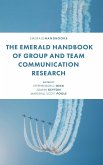This book provides a set of proven and easy-to-use procedures for conducting problem-solving meetings more efficiently and productively, with less frustration, effort, and conflict. The effectiveness of conventional meetings is seriously limited by such factors asthe added time required for the use of in-meeting rather than pre-meeting introduction of ideas;meeting time being allocated on the basis of the order in which individuals get the floor, rather than on the relevance and importance of the ideas being presented;an individual's fear of being punished for publicly opposing the ideas of a boss or other important person;reluctance on the part of low-status members to contribute;the pursuit of personal objectives on group time; time required to brief absentees, latecomers, and consultants on what has transpired; andcompulsive talkers. Author William M. Fox presents an approach called the Improved Nominal Group Technique (INGT) that eliminates or minimizes these limitations. He also tests of its use in many different, ongoing groups to show that most participants indicate, anonymously, that they prefer it to what they had been doing. "Very interesting and practical ... It can serve as a handbook for the novice or a reference book for the experienced problem solver."-James Showkier, supervisor of Training and Development at TRW "This is a book of basic theoretical importance as well as a manual for practitioners ... A new and distinctive contribution."-Eric Trist, founder of the sociotechnical systems approach to organizational design "This short, highly readable book should find its way into the hands of managers truly willing to tap the wellspring of employee creativity and motivation ... its prescriptions and recommendations, if followed, could do much to improve organizational productivity."-William Werther, Samuel Friedland Professor of Executive Management, University of Miami
Hinweis: Dieser Artikel kann nur an eine deutsche Lieferadresse ausgeliefert werden.
Hinweis: Dieser Artikel kann nur an eine deutsche Lieferadresse ausgeliefert werden.








